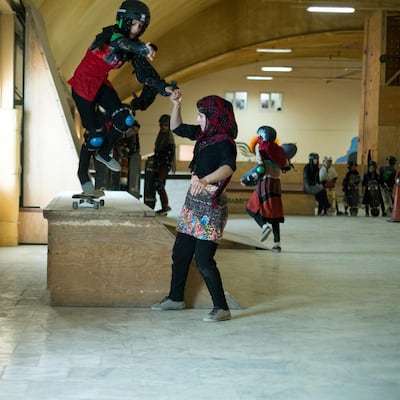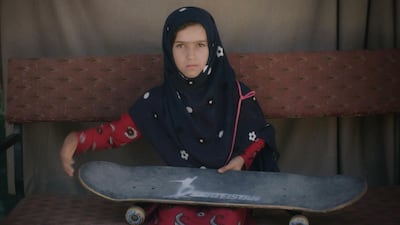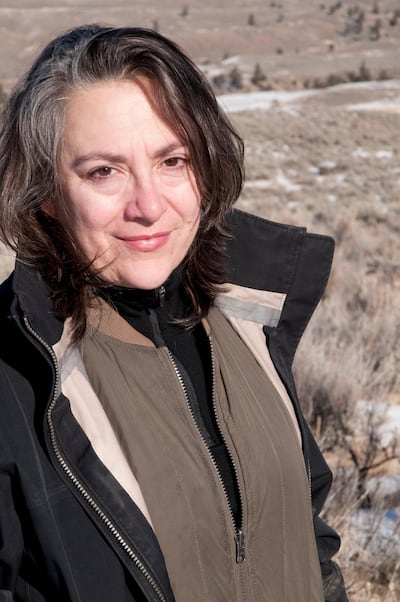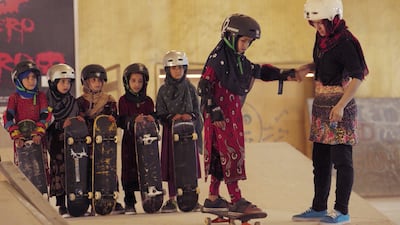"Well," says Carol Dysinger, dryly, "if I had known that skateboarding was the way to stop people getting fatigued by Afghanistan, I would've put the whole Afghan National Army on skateboards!" And she should know. A distinguished American filmmaker and lecturer, Dysinger has been travelling back and forth to the country for 15 years, documenting post-9/11 life there.
For her 2010 feature-length documentary Camp Victory, Afghanistan, she shot 300 hours of footage over three years with the Afghan National Army. After a festival premiere at South by Southwest in the US, the film's life was limited. But a decade on, Dysinger is back with Learning to Skateboard in a War Zone (if You're a Girl). Already the winner of the IDA Award for Best Documentary Short, it has since been nominated for gongs at next month's Baftas and Academy Awards.
Dysinger spent a year, on and off, filming at Skateistan, a remarkable school set up in Kabul to teach young children the pleasures of skateboarding. Originally started by Oliver Percovich, an Australian skate enthusiast, it's now fully run by Afghans. Notably, in a country where young girls are still forced into marriage, Skateistan offers a rare opportunity for female freedom of expression. "I didn't make a movie to promote Skateistan, but having spent as much time in Afghanistan as I have, and seeing – as the military say – 'the good idea fairy flutter about' … it was one of the first things I saw that really just worked," says Dysinger. "It was for the place it was in and it was for the people that were doing it. It wasn't anybody else's brilliant idea. It just grew up to fill the need."
Even for those children whose parents allow them to attend, taking lessons at Skateistan comes with more risks than merely grazed knees. Abduction is rife on the streets of Kabul and girls face frequent harassment. "There are neighbourhood schools that the girls will walk in a group to," says Dysinger, "but Skateistan is a little far away." They are driven by bus to and from the building three times a week.
Still, it's a vital pit stop, with the 300-odd youngsters learning courage in the classroom and on the skate ramps. An associate professor at New York University's Tisch School of the Arts, Dysinger was immediately drawn to Skateistan's educational mandate: if you only have half the answer, come to the front to be taught the rest. "Really, what they're teaching them to do is to raise their hand."
Lovingly shot by Menace II Society cinematographer Lisa Rinzler, Learning to Skateboard … was made with an all-female crew. "There was no other way to do it. If there had been a man in the room, everything would've changed," says Dysinger, 64. "Getting them to be at ease took a lot of calculation. I knew they would not be comfortable talking to me because I'm an elder – I'm like their great-grandmother – so they would be very respectful. That's the last thing I wanted."
In the end, they were interviewed by Zamarin Wahdat, who shot second unit photography for the project. Wahdat left Afghanistan when she was 3 and was raised in Germany. "I asked her to go to them and say, 'I don't know what my childhood would've been like if we'd stayed. Can you tell me?' Kids like to feel generous; like they know something you don't, that they have something to offer."
Skateistan has the full support of the international skateboarding community, says Dysinger. "Big skateboarders would go over and teach, but Skateistan was very smart – they were like, 'No, we're not here to make Olympic skateboarding teams.'" Instead, it's simply about offering a safe space to learn.

Now Dysinger's film is similarly making waves; pro skateboarder Tony Hawk even attended a screening. "The thing that is amazing about this movie that I did not predict at all is that people are watching it because they want to, not because it's the medicine they had to take to be a good citizen," says Dysinger. "And that's amazing – that gets people, I hope, to think about Afghanistan and the people in it as people, and not as victims who must be rescued or leeches that have sucked our blood."
Learning to Skateboard … is not Dysinger's first brush with awards season. Back in 1977, when she was enrolled at NYU, she won a Student Academy Award for her short film Sixteen Down. She was even handed the prize by the director Frank Capra, who kissed her on the cheek and said, "Gosh, I wish I'd made that movie." Yet being nominated for a documentary "at the other end of a life" is incredible, too. "God is a better writer than any of us could ever hope to be," she says. Over the years, Dysinger has worked as a screenwriter in Hollywood (co-scripting the 1986 movie The Christmas Star, which featured Fred Gwynne) and edited documentaries and features, including 2001's Rain, which was executive produced by Martin Scorsese. But now she's hoping Learning to Skateboard … might aid her next project, One Bullet Afghanistan. She still needs money to complete the post-production.
“It’s about a family that lost a kid to a civilian casualty incident in 2008,” she reveals. “The mother and I are the same age. She’s amazing and the two of us have this weird, interesting curiosity about each other. So I track what this one bullet, that killed their youngest, did to this family, but it’s through this lens of female friendship.”
The attention from the Baftas and Oscars will only increase the spotlight on Dysinger's latest film, and hopefully One Bullet Afghanistan. "I feel very grateful that both Academies, the British and the American ones, recognised and saw the depth of what I was trying to do, and saw Learning to Skateboard … as a movie and loved these women and these girls in the same way I did."
The Baftas take place on Sunday, February 2; the Oscars are on Sunday, February 9



